Welcome to 2019!
Time to level up your skillset.
You probably spent the last month or two reading 2019 prediction posts. Or posts about how those posts were absolutely wrong… LOL
So, instead of telling you what technologies and products will make waves in 2019, I thought it would be more beneficial (and fun) to talk about what you can do in 2019 to make sure you stay current and even ahead of the curve. Maybe even level up your career!
ie. – What skills will lead to the best new opportunities for your career!
I am basing these recommendations on what I’ve
Also, these are in no particular order and left ambiguous at times on purpose because different companies leverage these skills in different ways, so it’s up to you to firm up how to apply the skills.
Web Graphs
To make this more fun, I created a web graph … aka a Radar Chart for each skill.
Let’s quickly review how to read them before we get started.
Each skill has been given a rating between 1 and 5 in four different categories.
Generally: 1 = Not Good and 5 = Very Good.
So a perfect score would look something like this.
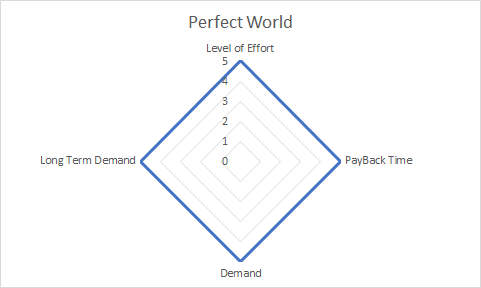
In this graph we have a skill that is the following:
- A “Very Good” in the Level of Effort category, means it’s easy to learn
- A “Very Good” Payback time, means you can put the skills to use quickly
- A “Very Good” Demand level, means it won’t be hard at all to get a job with this skill or to apply it to the job you already have.
- A “Very Good”
Long Term Demand, means learn the skill now and you will use it for a very long time.
Likewise, this graph would be the worst skill to learn.
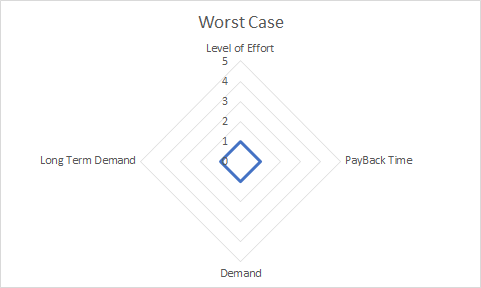
This skill would require a lot of effort to learn, would take a long time to realize value, isn’t in super high demand, and probably won’t be around until you retire.
So the easy way to look at this is the farther out the line is from the center the better!
The Skills List
1.) Public Cloud
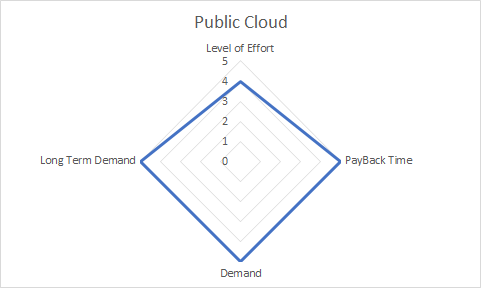
You’ve probably heard about this little thing called “the cloud” by now, right?
Q: Can you spin up a virtual machine or a database in the cloud? What about networking and VPNs?
There is so much to learn about the public cloud that you can find a dozen new blog posts every day. So my recommendation is to pick one of the three major clouds to start with and master the basics then, if desired, move on to a second one and repeat the process.
If you are a virtualization person, I would start with learning how to create VMs, if you are a DBA… spin up a database, if you are a programmer look into serverless functions. There is literally something for everyone.
The career ROI is not only quick but also long-term because almost every company out there has some sort of public cloud strategy.
If you are the “VM guy” at your company, do you remember when “the dinosaurs” that don’t work there anymore said they didn’t need to learn VMware? … Keep that in mind the next time you say you don’t need to learn public cloud.
2.) A Scripting Language
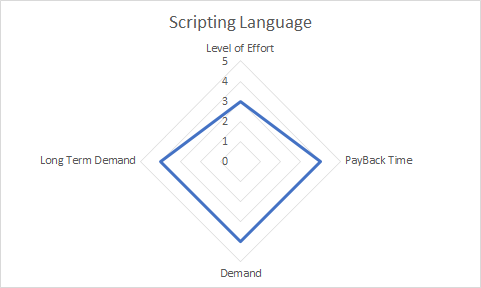
How many of you like doing the same thing every day? If you raised your hand you’re probably the same person who says they have IT burnout… The cure… automate the simple stuff, and give yourself more time for the fun stuff. In all seriousness though, scripting is amazing, it will seriously change your life.
Scripting can come in many forms. PowerShell has a HUGE community and can be run on almost all modern version of Windows, as well as on Linux and Mac too! So I would recommend checking it out first.
If you are looking for more Linux specific/native scripts and don’t want to install PowerShell core on your server, then BaSH is the obvious choice.
Both PowerShell and BaSH are not likely to ever go out of style. They are also pretty easy to learn if you start off with the basics, and the benefits are nearly immediate as I’m sure you can already think of at least one thing you could automate with a script.
While you’re at it, go sign up for Github. Between scripting and the next
The largest project I did in 2018 was based on scripting. You can read more about zPlanner here.
3.) A Programming Language
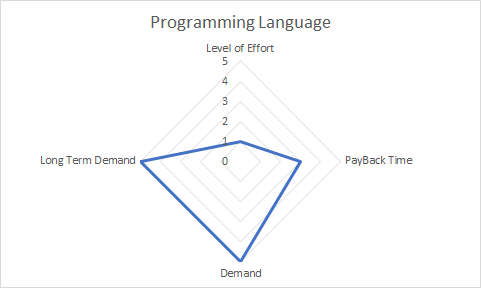
Once you master scripting the next skill you will probably want to explore is programming. Start with something like Python. You may be saying “I’m not a programmer”, but honestly there is only so much scripting can do.
Other things like “serverless” (AWS Lambda) and all the other function as a service stuff are based on things like Python and other traditional programming languages.
If you’re wondering what languages are hot Dice.com just posted 5 Programming Languages to Consider Learning in 2019.
Even if you decide programming isn’t for you, being able to read code is invaluable and worth the effort.
4.) Containers
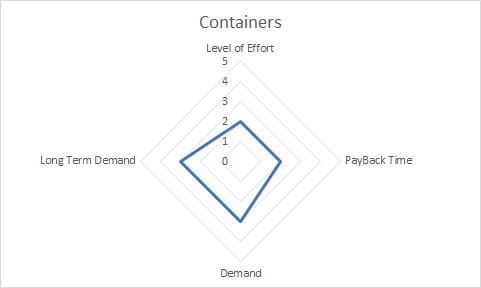
Some say containers will be the death of the virtual machine. I say maybe, but I also see future use cases for both. Some use cases are much better suited for containers though.
Containers are built from configuration files, and also leverage scripts too. Containers can be Windows or Linux based, and are great performing tasks that have a predictable workflow.
Containers are taking off right now, I ranked them a little harder to learn because you will need to know
Lastly, there are three technologies fighting for workloads, Virtual Machines, Containers, and “Serverless”, are all capable of preforming many of the same workloads. So which one will “win” and claim the majority of workloads is still TBD. That’s why I only gave containers a 3 out of 5 in the Long Term Demand category.
5.) Linux
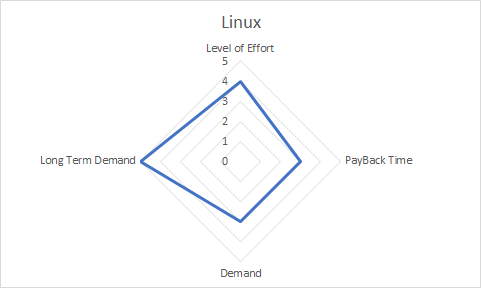
Ten years ago I was told that there was no point in knowing or recommending Linux because it wasn’t mainstream, wasn’t supportable, and wasn’t enterprise class.
Today, Microsoft has developed MSSQL on Linux, PowerShell Core is the future of PowerShell, and the majority of demo’s that you will see them do are ran from a Mac and generally involve Linux in some capacity.
I’m not saying Windows will ever go away, but there is an enterprise class alternative (just like their was 10 years ago). So what has changed? Perception and open-minded businesses who are more interested in a platform that is stable and good for the bottom line.
Linux is a great career investment at this point, and it will be far into the future. A good understanding of Linux gives you the base you need for other things like scripting, programming, DevOps, and so much more.
Getting started is easy, download Ubuntu Desktop and put it on a machine. Try using that machine a little more every day, eventually you will see what Windows isn’t a requirement to be productive.
6.) DevOps
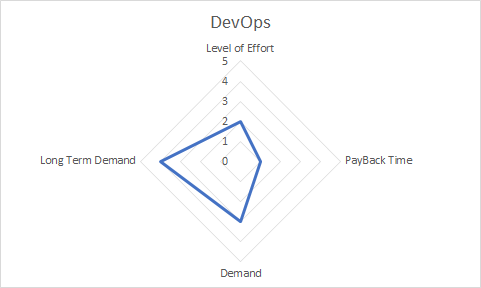
DevOps is a little harder to define because it can be pretty specific to what you are trying to do. The general idea (at least as far as I understand it) is that DevOps is the process of moving code from a developer through the build process and delivery process.
The closest I’ve come to DevOps is when I used Azure DevOps to automatically build my zPlanner container and publish it to the Docker Hub.
Because each program is a little different, the DevOps process and tools will also be a little different. If you want to become a DevOps guru, my advise it to get to know a couple of projects that are automating the build and delivery process and learn how they work. Pick ones that are different enough to give you some variety. Then you should be able to figure out a process to apply to a project that your company has.
The development operations process has been around way longer than the “DevOps” buzzword, and as long as we are still creating code there will be demand for dev ops in some form or another.
7.) Network / Information Security
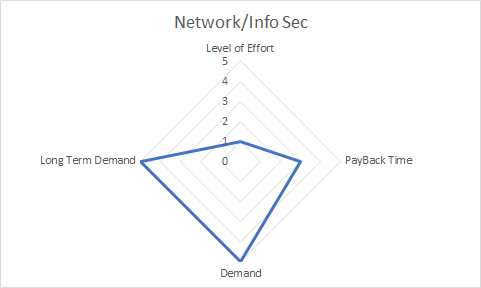
CBR Online published a great article in October of 2018 that looked at just 6 months of data from 2018 (January-June). CBR Online says that there were over 4.5 BILLION data records
I’m guessing you can understand what the web for Network / Information Security is the way it is. Clearly, we need more InfoSec guys looking at code and watching network traffic. It’s also pretty clear that it must be difficult to learn InfoSec as things don’t seem to be getting any better.
If you’re looking to get into the I.T. industry I can’t think of a better place to start. Since the beginning of time there have been bad guys, and equally as long have existed the good guys who try to stop them. I highly doubt it will ever change.
8.) IOT / Sensors
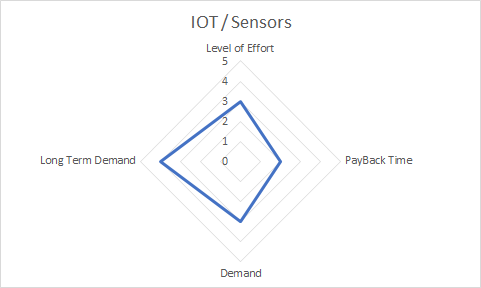
“You mean reading temperatures and humidity and stuff right?”… Umm not exactly. IOT and sensors come in many different forms, and the rate in which we are all deploying them is mind blowing.
Tech Radar confirmed that Amazon Alexa was down on Christmas this past year due to so many new devices coming online.
Other companies are also rapidly gathering as much data from sensor type devices as possible. The idea is ageless… the more I know the better off I’ll be.
Helping develop sensor networks, as well as the code to analyze the data is sure to be a hot area of tech for the foreseeable future.
9.) Project Management
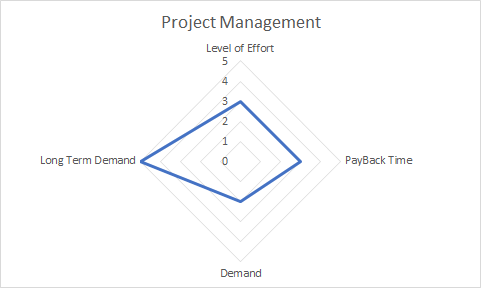
The last two skills on the list aren’t technically technical. Say that ten times fast LOL.
I’m sure everyone reading this post has had a good experience and a bad experience during a project. Chances are the good experience project had a project manager. The bad experience was either a bad design, or a poorly ran project.
Having good project management skills are a great skill to have for many reasons. The obvious reason is to manage projects, the not so obvious reasons are for things like working from home effectively, and simply managing your daily schedule.
If you every decide to move into management, having the ability to juggle multiple projects and manage people effectively can also be considered a sort of “long term” project.
Project management, time management, etc will always have a demand. I marked the level of effort and the payback time a little lower because depending on your current role you may not instantly realize a benefit from project management skills, but having them long term will certainly pay off.
10.) People Skills
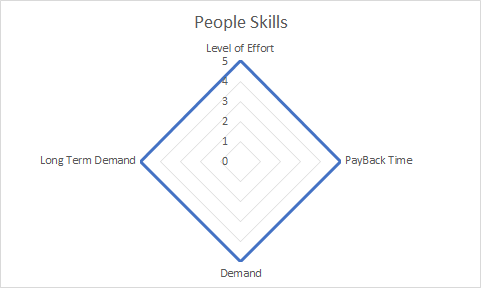
Let’s not kid ourselves, most I.T. people fall into one of two categories super nerd or social butterfly. Those who can do both well are rare, and companies try to scoop those people up as quickly as possible!
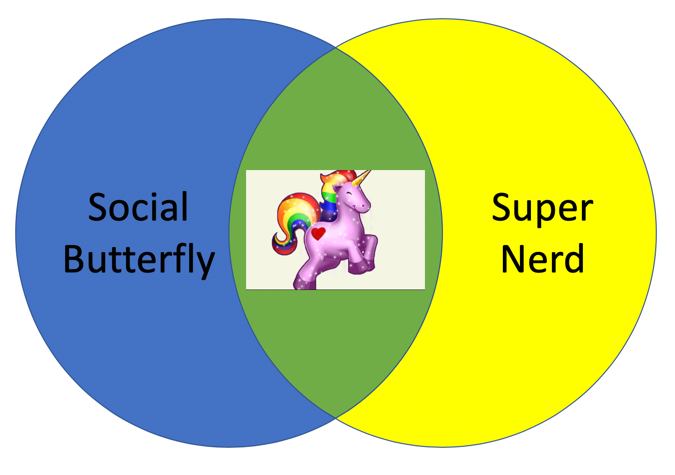
Two roles, in particular, come to mind where people skills trump everything else. Sales Engineering and Technical Support.
A Sales Engineer / Solution Architect who has the ability to explain a project to a customer at both a high level as well as go super deep when needed is what helps close deals. It shows that you know your stuff and you can explain the value as well as the tech.
The other field is technical support. Tech support reps have to deal with all sorts of stuff, all while keeping a smile. Having great people skills can help calm down a customer as well as give you the drive to go the extra mile when needed. Customers generally understand that things break and won’t remember the problem long term, what they do remember is how the support experience was.
I gave People Skills a perfect score in all four categories because this skill is never going to go out of style, and it pays off instantly. (Remember that saying about first impressions?) It’s also not hard to be nice and do the right thing. I think we would all agree that employees who have people skills are much better than the alternative too.
Here is a great example too: Linus Torvalds circa 2013; Linus Torvalds circa 2018. The moral of the story is don’t be an asshole because sooner or later no one wants to work with you.

Bonus Tip: Be Social
This goes along with people skills, but be social. If you don’t use Twitter go sign up; if you don’t share stuff on LinkedIn, start sharing.
We all benefit by sharing, not only do you help someone else learn you will learn as well.
Keep in mind though, that employers do regularly look at social media profiles these days, so make sure what you do contribute is not derogatory or plain
You might have noticed…
You may have noticed that none of the things on my list involve traditional hardware like servers and SANs. Also missing is VMware and Hyper-V virtualization.
In my opinion, those fields are now a commodity. I’m not saying VMware or Hyper-V careers will go away, but I am saying that if you pride yourself on being “ahead of the curve”, it’s time to find the next curve. Maybe your next curve is the public cloud, or maybe you’re more of a containers person? Everyone’s path is different, my point is, as soon as your “awesome” at one tech curve… start working on the next one.
I have a great post on technology curves and why you need to always be learning. It’s called Why Innovation, Risk, and Curves make the best careers.
Let’s do this!

Well there you go, my opinion on what skills to work on for 2019. Hopefully this, and the other blog posts I’ve done (and will do) help you as you go through the coming year. As I personally explore these and other topics I’ll be sure to share what I’ve learned.
I wish you all a happy and successful new year!
![]()



Pingback: Why Innovation, Risk, and Curves make for the best careers | Justin's IT Blog
Love a good radar diagram!! 😉 Great stuff JP.
Just had to comment that for those of us on the “Super Nerd” portion of the diagram, the level of effort for “People skills” is a lot more than for learning a programming language. Computers are easy to talk to, they hear (execute) what you say (program) and nothing else. People all have their own interpretation and their own perspective, and that can change based on a thousand different factors we have no control over.
Otherwise, great article.